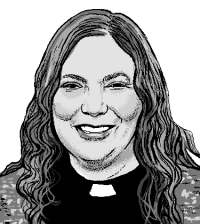Aliens welcome: Deuteronomy 26:1-11; Luke 4:1-13
As I write this, the kitchen table is shaking. If our table is shaking, I worry that the church’s beautiful stained-glass windows, desperately in need of repair, are also shaking. The parsonage is attached to the church and shares the same foundation. Seven feet away all hell is breaking loose. Several blocks of businesses that have served this neighborhood are being knocked down by giant backhoes and inflated real estate prices to make way for towering apartments.
Similar apartment towers have gone up a block away, offering amazing penthouse views across the Hudson River to the west and Central Park to the east. A studio starts at $1.5 million, and the pinnacle penthouse is five times that amount. The residents will be able to see across the river, but will they see into Lilia’s apartment half a block away? There, in the tower’s shadow, Lilia and her family live in a single-room cubicle without kitchen or closet and share a bathroom with 60 other people.
Lilia came here desperate to make a better life for her two children. She told me that in Mexico she could earn 250 pesos a week. Diapers cost 70 pesos, shampoo 30. “You can wash or you can eat,” she said. And so they pushed themselves through the barbed-wire fence. She said she didn’t even feel it cutting her at the time. The scars came later. And other barbs. My daughter told me that some high school girls she knows were talking about a group identified only as “DMs,” which means “Dirty Mexicans.”
Lilia and her family are part of this parish. I like the old geographical nature of the word, our parish, embracing the whole neighborhood—Lilia’s family, my family and the soon-to-be-our-neighbors’ penthouse family.
In Spanish, the word for parish is parroquia, even closer than the English to its Greek root, paroikia. Paroikia indicates a place of exile, a place where you might find a paroikos—a stranger, a resident alien. Our parishes are intended to be places of hospitality for the paroikos. Such ministry is not a sideline but our core identity as a church—an identity with a long history, as Deuteronomy reminds us. We don’t label our biblical ancestors as economic interlopers, suspect strangers or terrorists; we honor them and love them as foremothers and forefathers of our faith. We are to welcome each new paroikos in the same way.
A wandering Aramean was my ancestor; he went down into Egypt and lived there as an alien. Given the surge in anti-immigrant sentiment in many parts of our nation and the challenges posed by a growing number of economic refugees, this reading seems particularly timely. We are reminded that Abraham and Sarah were immigrants who left the land of their birth and became resident aliens.
Then there was Joseph, caught up in a whirlwind of familial, economic and international conflicts as a detained alien whose traumatic journey ultimately gained him legal status and enabled him to feed his family back home. Moses, a child truly left behind, became a resident alien in Egypt and the divinely appointed coyote who led a band of desperate refugees on a desert trek toward freedom. The Israelites later spent many years living in exile, resident aliens all. Ruth remained with Naomi as a paroikos in Israel.
The text from Deuteronomy tells of God’s migrant people on the verge of crossing into the land of promise. They are given a lengthy set of instructions to help them as they settle and build. The portion of text chosen for those of us on the edge of Lent comes with concern for a new danger in the land of milk and honey—the danger that when the sojourners settle, they will settle for something less than the vision and hope for liberation and justice that sent them forth in the first place. It proved to be a valid concern: those who entered the land did eventually settle for their own well-being as a group, neglecting the full liberating command of jubilee. They settled as possessors who overlooked the dispossessed and disconnected.
The Deuteronomist’s call to remember their connection with those who continue to be landless (the Levites) and those who continue to live as alien residents is also a call to praxis: Then you together with the Levites and the aliens who reside among you shall celebrate with all the bounty that the Lord your God has given to you and to your house.
The key word is together. How do we practice this borderless hospitality and radical stewardship? In my parish, separate worship celebrations in English and in Spanish are easier for many folks than bilingual services. Sharing a feast of soul food, tacos and Swedish meatballs is easier than sharing opinions at a bilingual congregational meeting. We must refuse to settle until there are none displaced from the feast—not our new neighbors in the pinnacle, not the homeless youth in our shelter, not the recent immigrants struggling with English.
After thousands of years we still haven’t got it right. Sometimes it’s tempting to settle for a lot less. And so we come to another alien in the desert. There at the edge, and potentially the tempting end of the wilderness experience, Jesus is given a chance to opt out. To settle for his own control and comfort. To isolate himself from wandering Arameans and parishes desperately in need of all sorts of unaffordable repairs. But like Lilia, this immigrant is desperate to make a better life for his children. And so he takes the desert route, refusing to settle for less even at the end, when faced with a crown of thorns sharp as barbed wire.






